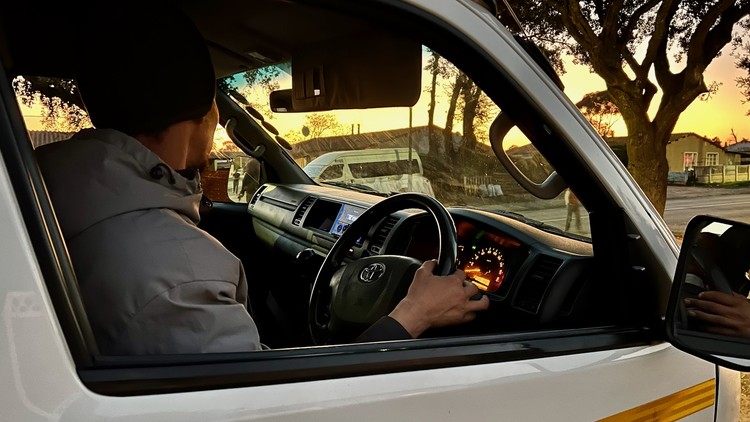The life of a minibus taxi driver: long days, poor pay and no benefits
Chasing the taxi bosses’ targets makes it hard to be compliant with traffic legislation, drivers tell GroundUp
Taxi drivers are “lenient” people, says this Atlantis minibus taxi driver. Photo: Peter Luhanga.
He asked not to be named. He’s a 36-year-old Atlantis resident, and he has been earning his living driving a minibus taxi for 14 years. He has two sons, aged three and nine.
“We leave our families in the dark and return in the dark, always thinking about our passengers and their safety,” he says.
Before he became a taxi driver, he worked for his father’s funeral parlour, preparing bodies and driving a hearse.
He has worked for five different taxi bosses. He became deputy chairperson of one local taxi association for three years; he is currently the secretary of that organisation.
His day starts at 4:30am. He works every day of the week to meet his boss’s target of R4,000 a week. This is the amount his boss keeps. (The boss is responsible for the maintenance of the taxi and covering the cost of fuel.) He takes home an average of R1,200 to R2,000 a week and it is a struggle to support his family on this.
Nonetheless, he says it is “exciting to be a taxi driver”. But municipal traffic police “are always looking to find a fault, to issue a fine”.
He says he gets fines every week, and he pays these out of his own pocket. The fines range from R500 to R5,000 for offences such as overloading or stopping on a red line while waiting to pick up passengers.
He says they park where people feel safe to board and these are often on red lines, such as outside shopping centres.
During the recent taxi strike, they carried on operating but only within Atlantis.
He says the taxi bosses of Atlantis want to “co-exist with the MyCiTi bus service”.
His association operates routes connecting central Cape Town, Table View, Melkbosstrand, Bellville, Darling, Vredenburg and Malmesbury.
He says his employment is based on a verbal agreement and without a written contract.
“There are no benefits whatsoever – no retirement benefits, no UIF (Unemployment Insurance Fund), no fixed salary, no leave days. It’s really frustrating … It’s sad.”
“Drivers need specific recognition from the government, because the services we render are significant,” he said.
We also spoke to another Atlantis taxi driver who also provides staff transport for factory workers. He starts his day as early as 4am and gets home at midnight.
“It is not easy for me to be 100% compliant with traffic legislation and related by-laws. I’ll stop right where there is a passenger waiting, cause if I don’t, another minibus taxi will take the passengers. We need to survive. It’s about survival. We don’t mean any harm to anybody,” he said.
He complained that illegal operators, known as “amaphara”, cut into their business.
He accused municipal traffic officers of taking bribes. “I must buy a drink and buy a big bucket of KFC containing 21 pieces just to get away from the fine,” he says.
“They don’t talk like they are talking to a human. They swear, ‘Don’t talk kak to me, just give me your fucking permit.’ Stuff like that.”
His boss has set his target at R600 per day and he doesn’t always reach it.
“I need to reach the target to get to bed well,” he said.
Support independent journalism
Donate using Payfast

Don't miss out on the latest news
We respect your privacy, and promise we won't spam you.
Next: Gauteng farming community without consistent water for three years
Previous: Explained: How a judge gets impeached
© 2023 GroundUp. This article is licensed under a Creative Commons Attribution-NoDerivatives 4.0 International License.
You may republish this article, so long as you credit the authors and GroundUp, and do not change the text. Please include a link back to the original article.
We put an invisible pixel in the article so that we can count traffic to republishers. All analytics tools are solely on our servers. We do not give our logs to any third party. Logs are deleted after two weeks. We do not use any IP address identifying information except to count regional traffic. We are solely interested in counting hits, not tracking users. If you republish, please do not delete the invisible pixel.

